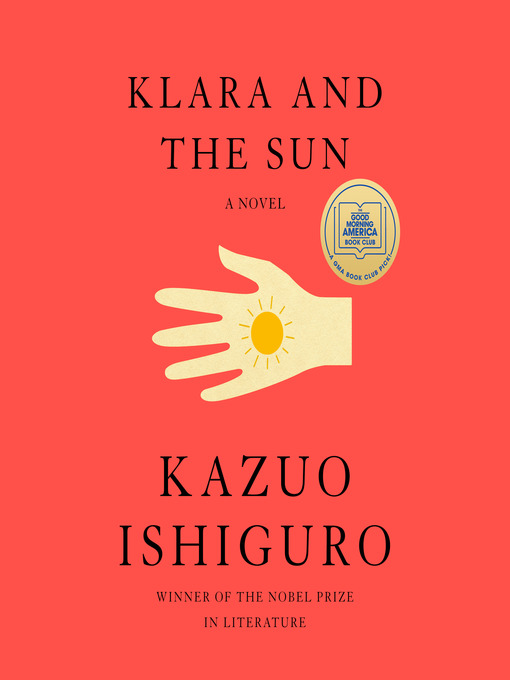- New eBook additions
- Try something different
- Most popular
- New YA additions
- See all ebooks collections
- New audiobook additions
- Try something different
- Most popular
- New YA additions
- See all audiobooks collections

Starred review from November 30, 2020
Nobel laureate Ishiguro takes readers to a vaguely futuristic, technologically advanced setting reminiscent of his Never Let Me Go for a surprising parable about love, humanity, and science. Klara is an Artificial Friend (AF), a humanlike robot designed to be a child’s companion. She spends her days watching humans from her perch in the AF store, fascinated by their emotions and hungry to learn enough to help her future owner. Klara, who is solar-powered, reveres the sun for the “nourishment” and upholds “him” as a godlike figure. Klara is eventually bought by teenager Josie and continues to learn about humans through her interactions with Josie’s family and childhood friend. When Josie becomes seriously ill, Klara pleads with the sun to make her well again and confronts the boundary between service and sacrifice. While the climax lends a touch of fantasy, Klara’s relationship with the sun, which is hidden at times by smog, touches on the consequences of environmental destruction. As with Ishiguro’s other works, the rich inner reflections of his protagonists offer big takeaways, and Klara’s quiet but astute observations of human nature land with profound gravity (“There was something very special, but it wasn’t inside Josie. It was inside those who loved her,” Klara says). This dazzling genre-bending work is a delight.
Starred review from June 1, 2021
Nobel Prize winner Ishiguro's eighth novel (after The Buried Giant)--a poignant, ultimately celebratory exploration of what it means to be human--is beautifully realized in narrator Sura Siu's virtuosic performance of Klara, a solar-powered AF (artificial friend) who has been purchased for Josie, a critically ill teenager. Through the narrow frame of Klara's earnest and childlike first-person point of view, a disturbing near-future dystopia is gradually revealed; technology has "lifted" children to exceptional intelligence, but has also "substituted" many adults out of jobs, resulting in a starkly divided society that seems to be teetering on the brink of collapse. With hopes of finding a cure for Josie's mysterious illness, Klara tries to learn all she can from her experiences; in the process, she acquires not just knowledge but also humanity. Ishiguro's precise, deceptively simple prose, coupled with Klara's limited viewpoint, creates a stifling sense of foreboding that Siu wonderfully contrasts with her spirited voices for the novel's often-exasperating human characters. Siu's depictions of Klara, Josie, and Josie's teenage friends will likely resonate with many YA listeners (and their parents). VERDICT This powerful look at the varied and often negative consequences of modern technology underscores the fragility and preciousness of human beings--an all-too-acute awareness in a world coping with a global pandemic and widespread social upheaval.--Beth Farrell, Cleveland State Univ. Law Lib.
Copyright 2021 Library Journal, LLC Used with permission.
Availability can change throughout the month based on the library's budget. You can still place a hold on the title, and your hold will be automatically filled as soon as the title is available again.
The OverDrive Read format of this ebook has professional narration that plays while you read in your browser. Learn more here.
Your session has expired. Please sign in again so you can continue to borrow titles and access your Loans, Wish list, and Holds pages.
If you're still having trouble, follow these steps to sign in.
Add a library card to your account to borrow titles, place holds, and add titles to your wish list.
Have a card? Add it now to start borrowing from the collection.
The library card you previously added can't be used to complete this action. Please add your card again, or add a different card. If you receive an error message, please contact your library for help.